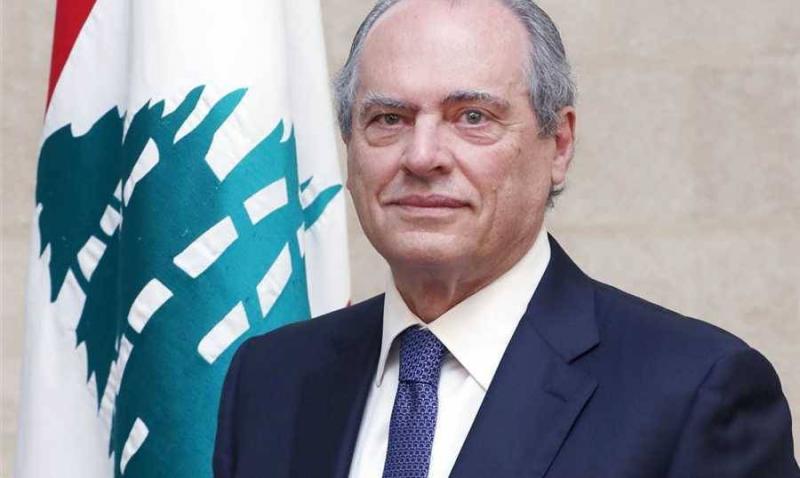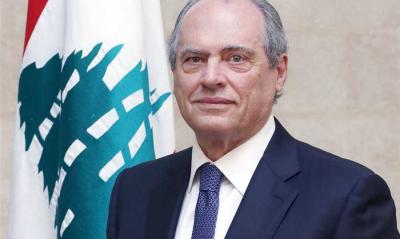Deputy Prime Minister Saadeh Shami stated: "There is no direct link between holding parliamentary elections and what was agreed upon with the International Monetary Fund (IMF). However, our hope is to quickly approve the laws we have completed, which have been referred to the parliament, and they should be approved in their final form as soon as possible."
Shami, in an interview with "Al-Liwaa," emphasized that the next government must continue to implement the agreement that this government reached with the IMF, considering that governance is a continuity. He expressed optimism about achieving a positive result in ongoing negotiations with the IMF if the required reforms are fully implemented, primarily addressing the referred laws, as the international community cannot provide any assistance without the necessary actions. He affirmed the country's need for salvation, urging everyone to exert all efforts for that.
In parallel, parliamentary sources concerned with negotiations are calling for waiting to see the results of the upcoming elections to understand how the council will deal with the proposed files, and whether the new parliament will witness disputes and conflicts or will be able to address people's crises. The sources argued that the relationship between the government and the IMF cannot be termed as an agreement but rather as guidance and conditions set by the Fund that must be effectively translated to address the crisis by enacting laws and implementing fundamental plans to tackle waste, including in the electricity sector.
The sources stressed that the reason for the delay in implementing the required measures is the need for a political decision and will. They argue that the main political leaders have not had the serious decision and courage to take action before the elections, which the Fund took into consideration. Now that this obligation has ended, there are no excuses left for these leaders to avoid implementing the painful reforms.
The sources see that the first challenge for the new parliament and the government that will emerge from it, along with the political leaders likely to return to power, is to decisively implement the reforms. Otherwise, we will face a significant crisis, especially with the international community preoccupied with the political, military, and economic developments affecting the troubled world due to the significant economic downturn caused by the Russian-Ukrainian war, which has begun to herald a global food crisis and a fuel crisis in 2023.
The sources confirm that the conditions in Lebanon are, whether we like it or not, linked to all these crises, especially regarding the nuclear agreement between the United States and Iran, particularly since developments in this file last week did not indicate a resolution, with 62 members of both the Republican and Democratic parties in the U.S. Congress voting against this agreement out of 100, meaning that the atmosphere of conflict still prevails. For their part, sources from the Lebanese negotiating delegation with the IMF stressed the necessity for the new parliament to start by addressing the bills present in parliament related to Lebanon's agreement with the IMF and working to approve them as quickly as possible, especially concerning the 2022 budget project, the capital control law, the amendment of the banking secrecy law, and the framework law for banking restructuring, in addition to unifying the exchange rate and completing the financial audit of the external assets of the Central Bank to fulfill the required obligations for signing the final agreement with the Fund and for Lebanon to benefit from the Fund's assistance.
Regarding whether the new parliament will approve the capital control law after the current parliament rejected it, sources note that this law has been a topic of discussion, and some deputies had a genuine intention to introduce some amendments to it. The reason for its non-approval by the current parliament is perhaps because several deputies acted both as legislators and candidates simultaneously, which made them hesitant to approve it on the eve of the elections.
The sources affirm that Lebanon has no choice but to approve the essential projects as quickly as possible, as the cost of every day of delay is high for the country, with the little remaining foreign currency reserves being exhausted, leading to increased suffering for the Lebanese people.
Regarding expectations of further collapse, especially concerning the exchange rate of the lira against the dollar after the parliamentary elections, the sources point out that it is usually the task of central banks to intervene if there are significant variations and changes in the exchange rate. However, what is needed is to unify the exchange rate and maintain its level rather than fix it so that it operates within a defined margin and prevents price multiplicity. Therefore, central banks must act to return it to a reasonable level, but this cannot occur until the central bank rebuilds its reserves of foreign currencies, as it is currently using depositors' funds, knowing that the current reserve no longer exceeds $12 billion.




